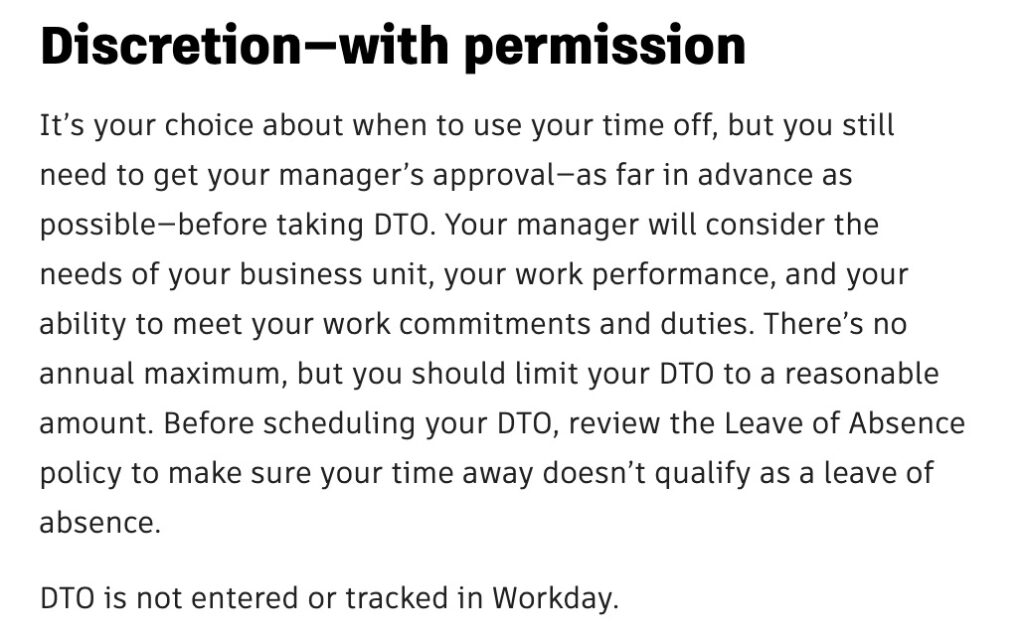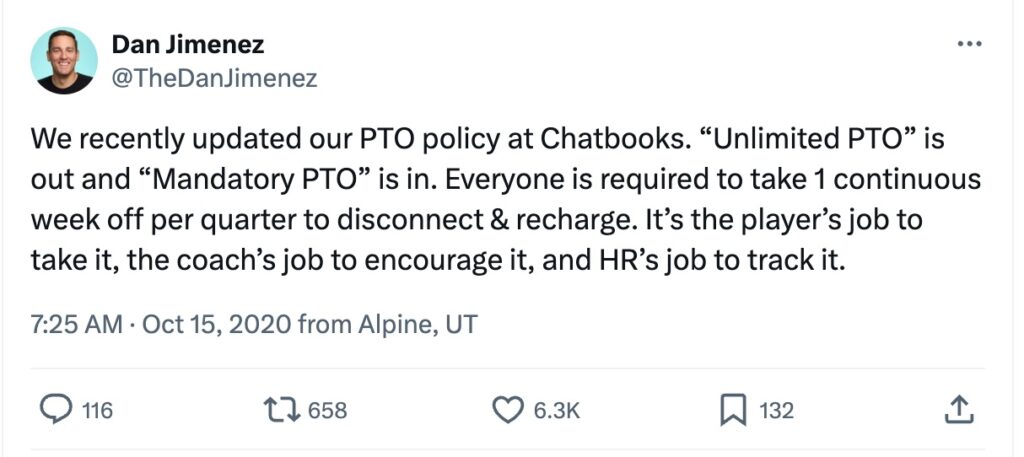Need an unlimited PTO policy example to use for your company?
I’ve included a bunch below, along with my take on their strengths and weaknesses.
1. An Unwritten, Truly Unlimited PTO Policy
To go truly unlimited, you simply delete your PTO policy.
There’s no policy to copy and document. You tell people that you don’t have a vacation policy and if they need time off, take it.
If this seems scary, that’s because it is.
And it’s exactly what Netflix did when they rolled out their unlimited vacation benefit. A ton of the details of how this came about are in the book No Rules Rules. If you’re considering a true unlimited PTO policy, I highly recommend reading the book. It covers a ton of the details.
The key thing I took away is that a true unlimited PTO policy requires the company leadership to model good vacation behavior. Instead of having a written policy, folks lead by example.
It’s not perfect but that’s how it was done at Netflix for a long time.
Would I roll out an unlimited PTO policy like this and just delete it? I would not.
First, I’m not a huge fan of unlimited PTO policies to begin with. But let’s put that aside.
Sooner or later, you will have someone that causes PTO problems. They’ll take too much, take a huge vacation at a horrible time, something. And it won’t be a one-time thing. People that cause issues tend to keep causing them.
Without a policy, you’ll have a much harder time protecting yourself while making any performance-related changes that you need to.
I’d get something written down.
2. A Standard Unlimited PTO Policy
If you’re going to have a written policy, it’ll probably look similar to this unlimited PTO policy from Autodesk:

There’s a few common components that I see across most unlimited PTO policies:
- It does require a manager’s approval.
- A requirement to notify their manager as early as possible.
- Language that the manager will consider the “needs of the business unit, work performance, and ability to meet work commitments” is used in a lot of these policies. It gives managers a reason to deny PTO requests when they need to.
- Doesn’t specify an annual amount, only says that it should be “reasonable.”
- Usually mentions that the unlimited policy is separate from other leave policies (parental leave, jury duty, leave of absence, etc).
There’s a lot of things that irk me about a policy like this. But they’re all aspects of unlimited PTO. Saying annual leave should be “reasonable” isn’t helpful to anyone. And saying a manager will consider the “needs of the business unit” first doesn’t set a great tone. For me, employees should always know how much annual time off is expected. And denying PTO should be the exception, business needs shouldn’t be the primary consideration.
That said, the above policy is probably as good as you’re going to get. I do like how short it is. Every sentence has a clear purpose.
If you want a safe policy that doesn’t rock the boat and protects the company, you’ll end up with something very similar to this one.
3. My Favorite Unlimited PTO Policy with Mandatory Time Off
In 2020, the president of Chatbooks, Dan Jiminez, tweeted that the company would be getting rid of its unlimited PTO policy in favor of a mandatory PTO policy. This has a nice balance that I like:

At this point, it’s not really an unlimited PTO policy anymore. I’d bet that people will take the 1 week/quarter and only take other days off for sick time, family events, and personal appointments. It’s really just a quarterly lump-sum policy with flexible sick time. But who cares if it works and people get the rest they need?
This is probably my favorite “unlimited PTO” policy that I’ve found so far. Force people to take a certain amount of time off, then use the “unlimited PTO” for emergencies and short term stuff that comes up. And it does address the biggest weakness of unlimited PTO: people not using PTO.
Interestingly, they also have a PTO blackout in their policy:

While I’m typically against PTO blackouts that last so long, I think the mandatory 2 week Winter Break balances it out.
Top marks from me, it’s a solid policy.
If I absolutely had to use an unlimited PTO policy of some kind, I would model it off of this one. While avoiding the PTO blackout unless I had a seasonal business.
4. An Unlimited PTO Policy That Your Lawyers Will Love
I wouldn’t copy this unlimited PTO policy. But if you want a policy that’s 100% buttoned up and approved by legal, you’ll end up with something like this.
It’s a policy from Payroll Management, Inc.
It has all the standard stuff like:
- PTO requires approval
- Can be used for a variety of reasons
- Needs of the job must be balanced with PTO requests
- Must give notice
- Won’t be paid out if the employee leaves
Pretty standard stuff.
My main issue with this policy is that it feels like a lawyer wrote it. Check out this paragraph on giving notice:

It does give all the details someone needs. Actually, it gives too many details. Every edge case has been addressed to the point where it starts to impact the clarity of the policy. But the key thing every employee needs to know (how much notice should I give?) is absent. All the employee can take away is “give proper notice.” So what’s proper? They need to check a completely different policy to figure it out. I’d be shocked if more than 10% of employees checked the other policy to get the answer.
Even worse, the whole policy just feels “off” as an employee. The company wrote the entire policy to protect the company in every instance. Protecting employees was an afterthought.
Any policy that’s over-engineered communicates that the business is more important than the employee. Sometimes, you need to do this. But not with a PTO policy. The whole point of PTO is to help protect employees. When they’re protected, the business does much better over the long term.
Get the clauses you really need to protect your company into your unlimited PTO policy, but I’d be careful not to add too many.
Potential Components of an Unlimited PTO Policy
When writing your own policy, consider including:
- If a manager’s approval is needed.
- What the manager will consider when approving or rejecting PTO.
- That vacation requests should be “reasonable.” Or a required amount if you have one.
- How much notice you require.
- Where to request the PTO.
- If the policy includes part-time employees.
- If there are additional requirements for approvals of vacation longer than 1 week.
- How the unlimited PTO policy relates to other leave policies.
- Different requirements for unplanned absences (emergencies, getting sick, etc).




